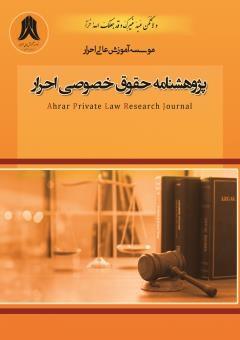بررسی شرایط ربای معاوضی و مقایسه آن با خسارت تأخیر تأدیه
محورهای موضوعی : حقوق مدنی
فاطمه جامعی
1
*
,
هیراد مخیری
2
![]() ,
محسن پورمحمد
3
,
محسن پورمحمد
3
1 - دکتری حقوق خصوصی، گروه حقوق، دانشکده علوم انسانی، واحد تهران مرکزی، دانشگاه آزاد اسلامی ، تهران، ایران.
2 - دکتری روابط بینالملل، گروه علوم سیاسی، دانشکده علوم انسانی، واحد زنجان ، دانشگاه آزاد اسلامی ، زنجان، ایران.
3 - استادیارگروه معارف اسلامی، گروه معارف اسلامی، دانشکده پیراپزشکی، پرستاری مامایی حضرت زینب لنگرود، دانشگاه علوم پزشکی گیلان ، رشت، ایران.
کلید واژه: رباى معاوضى, کالای همجنس, مكيل و موزون, خسارت تأخير تأديه, حرمت تادیه, حرمت ربا, مشروعيت تادیه,
چکیده مقاله :
معاملات به صورت داد و ستد كالاها از ديرباز متداول بوده است و گاه در چنين معاملاتى يكى از دو مال همجنس كه مكيل و موزون باشند در برابر ديگرى با زيادت در يك طرف مبادله و باعث تحقق يكى از اقسام ربا تحت عنوان «رباى معاوضى» میگردد. همچنين گونهی ديگرى از زيادت در دارايى در معاملاتى است كه طرفى تعهد خود را در موعد مقرر انجام نداده و در نتيجه موجب ايجاد ضررى براى طرف مقابل شود و بايد خسارت ناشى از اين تأخير را جبران نمايد كه به آن «خسارت تأخير تأديه» گويند. از آنجايى كه هر دو اين موضوعات موجب زيادت در دارايى طرف مقابل میگردد در پژوهش حاضر ضمن بررسى رباى معاوضى، شرايط تحقق و مقایسهی آن با خسارت تأخير تأديه از اين جهات، در پاسخ به اين سؤال كه «آيا اخذ خسارت تأخير تأديه از مصاديق ربا محسوب میشود و همانند رباى معاوضى حرام است يا مشروعيت دارد؟» با بررسى حرمت در رباى معاوضى و همچنين ذكر ادلهی مشروعيت خسارت تأخير تأديه به اين نتيجه رسيديم كه هرچند بعضى شرط نمودن جريمه تأخير تأديه را حیلهای براى دريافت ربا میدانند ليكن مواد قانونی متعددی نشان از پذیرش آن توسط قانونگذار دارد و از سوى بيشتر فقها نیز بنا بر ادلههای متعدد مشروع دانسته شده و مستلزم افتادن در رباى محرم نمیباشد.
Transactions in the form of trade in goods have long been common And sometimes in such transactions one of two items of the same type that are of equal weight, On the other hand, it is exchanged in excess on one side and causes the realization of one of the types of usury called "exchange usury".There is also another type of increase in assets in transactions in which one party does not fulfill its obligation on time and as a result causes a loss to the other party and must compensate the damage caused by this delay, which is called "payment delay compensation".Since both of these issues increase the other party's assets,In the present study, while examining the exchange usury, the conditions of its realization and comparing it with the compensation for late payment in these respects, in response to the question that "Is obtaining compensation for late payment one of the examples of usury and is it sanctity or legitimate like exchange usury?"Examining the prohibition of usury and also mentioning the reasons for the legitimacy of late payment damages, we came to the conclusion that although some consider imposing a penalty for late payment as a trick to receive usury.However, several legal articles indicate its acceptance by the legislator, and it is considered legitimate by most jurists for various reasons, and it is not sanctity usury.
Ibn Qadamah, Abdullah. (Bi Ta). Al-Mughni. The fourth volume. out of place.
Isfahani, Mohammad Hossein. (1997). Margin of Al-Makasab. Publications of Al-Mattaba
Al-Elamiya.
Imam Khomeini, Seyyed Rooh Allah (2000). writing Imam Khomeini Works Editing and Publishing
Institute, Volume 1.
Emami, Seyyed Hassan. (1985). Civil rights. The fourth volume. Tehran: Islamiya Publishing House.
Al-Hur al-Amili, Al-Sheikh Muhammad bin Al-Hassan. (1991 ). The description of Shia means to the
detail of Shari'a issues. The eighteenth volume. Qom: Al-Bayt Institute (AS) Lahia al-Tarath.
Hosseini Ameli, Mohammad Javad. (1945). Muftah al-Karamah fi Sharh al-Qasas al-Allamah. The fourth
volume. Qom: Al-Al-Bait Institute (AS).
Khoei, Abolghasem. (1992). Misbah Al-Fiqahah Qom: Ansarian Publications.
Shaheed Thani, Zainuddin Al-Jabai Al-Omili. (2016). Al-Rawza al-Bahiyyah in Sharh al-Lama al-
Damashqiyyah. first volume. Qom: Scientific Publications.
Katouzian, Nasser. (1996), civil rights: non-contractual obligations: compulsory guarantee: civil liability.
first volume. First Edition. Tehran: Tehran University Press.
Hali researcher, Abu al-Qasim Najmuddin Jafar bin Al-Hassan. (1988). Islam's laws in matters of halal
and haram. Volume 1. Tehran: Esteghlal Publications.
Muslimi, Abulqasem. (2012). Cash payment delay damage. Master's thesis in private law. University of
Tehran.
Mufid, Muhammad bin Nu'man. (1989 AH). Al-Nashar al-Islami Institute of Al-Madrasin Boqm al-
Mushrafah.
Najafi Esfahani, Mohammad Hassan. (1980). Jawaharlal Kalam. The twenty-third volume. Qom. Darul
Kitab al-Islamiya Publications.
Hosami, Mohammad Aziz. (2011). "Fiqh foundations of the ability to claim damages for late payment
from the perspective of Islamic religions". Number 1, 45th period, pp. 61-82.
Soltani Renani, Mahdi. (2006 ). "A comparative look at the compensation for "delayed payment damage"
in jurisprudence and law". Jurisprudence Quarterly, 13th year, 4th issue. pp. 139-136.
Abdi, Yaser, Jafarzadeh, Jafar. (2014). "Investigation of the conditions for the realization of commercial
usurpation". Four-way National Conference on Humanities, Shiraz.
Ghaffari Cherati, Musa, Jafarzadeh, Jafar, Shakri Eski, Mohammad. (2016). International Conference on
Islamic Law and Jurisprudence. Babol.
Aziz, Mohammad Ali. (2006 ). "A new look at the criterion of sanctity of usury". Islamic Law Quarterly.
The eleventh number. The third period. pp. 9-40.
) Mousavi Bojanvardi, Seyyed Mohammad. (2001). "Legitimacy of late payment damages". Mateen
research paper. 19th issue, 5th period. pp. 3-22.

